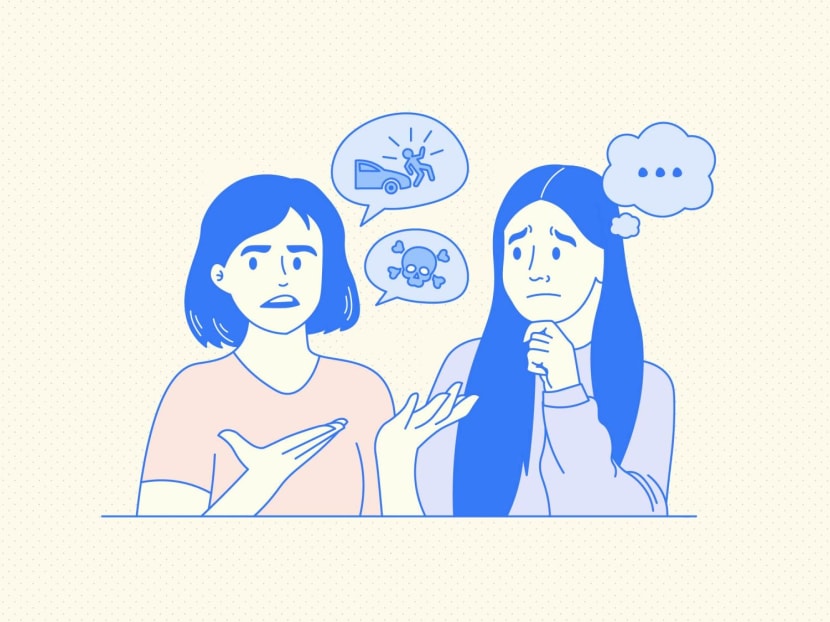Gen Zen: My friend sometimes jokes about dying, but how can I tell if it’s something more serious?

(Illustration: CNA/Nurjannah Suhaimi)
Warning: This article discusses self-harm and suicide.
SINGAPORE — I have a friend who tends to express her thoughts quite openly about not wanting to live. If you don’t know her well, some things can be shocking to hear at first.
She would say, for instance: “I wish I’d get hit by a car.” Or, “Life is meaningless. Why was I even born?”. Or, “I wouldn’t mind not waking up forever”.
These utterances would come up whenever she finds herself in a tough spot.
Since I have known her for almost seven years now, I would say that I have become "immune" to her morbid expressions, which are sometimes said in a casual, lighthearted tone.
Could she be joking? Even if so, it does not mean that I am less worried about her state of mind.
Recent statistics have shown that there is much to be concerned about when it comes to young adults' mental health. In a survey involving 1,000 Singaporeans aged 21 to 74 last October, one in four responents under the age of 35 said that they have seriously considered self-harm or suicide at least once.
With all the mental health topics that are being widely covered by the media now, I was introduced to the term "suicidal ideation" while browsing through online articles on various mental health trends.
From what I understood, "suicidal ideation" means having thoughts about what life would be like after you are dead, as well as your life coming to an end, but not necessarily by suicide.
Immediately, I thought about my friend because this sounded very much like her.
I have always wanted to ask her about it, but we are not close enough that I would feel comfortable asking about something so private or personal without feeling intrusive.
Is my friend suicidal? What is the difference between suicidal ideation and having suicidal thoughts?
Does this mean that every time I hear someone (or myself, for that matter) talk about their own death, I should be deeply concerned?
To help answer some of these questions that are troubling me and to find out if my friend needs help beating the blues, I decided to talk to a few psychologists to understand more of what may be going on in her mind.
WHAT IS SUICIDAL IDEATION AND IS IT SERIOUS?
Dr Annabelle Chow, principal clinical psychologist at Annabelle Psychology, said that suicidal ideation typically refers to, and includes, suicidal thoughts.
The term also includes mental images, wishes or ideas of suicide and death.
She noted that there are two main forms of suicidal ideation:
- Active suicidal ideation refers to an immediate, specific and genuine desire to harm yourself, with death as a consequence
- Passive suicidal ideation is when someone thinks about death and suicide without a plan to do so, such as my friend’s expression of wanting to get hit by a car, but it does not necessarily mean she is actively trying or planning to take her own life
“We might assume that passive suicidal ideation would be less ‘serious’ than the active form. However, this is false and has been disproven in large population studies,” Dr Chow said.
“Any form of suicidal ideation, passive or active, is a serious concern, and one is not likely to predict a suicide attempt more than another.”
Hearing this, I was reminded of a younger ex-colleague who occasionally used short-form lingo such as "KMS" wantonly whenever she messed up or felt stuck. "KMS" is short for “kill myself”.
Dr Chow said: “The moments that we tend to use these phrases usually indicate some level of momentary distress, upset, frustration, irritation, humiliation or any other negative emotion that warrants some sense of ‘I’d rather not be alive at this moment to experience what is happening’.
"However, I would be hesitant to say that jokes about dying would be an indicator that someone is stressed out about life. It is truly subjective, depending from person to person, and even moment to moment."
Ms Janet Gay, a counsellor at mental healthcare company Intellect, said that the key difference lies in the scope and depth of the mental state.
“On one hand, intense and frequent suicidal ideation can suggest underlying mental health conditions like depression and anxiety. However, it’s important to note that not everyone who experiences suicidal ideation will act on those thoughts.”
Mr James Chong, clinical director of psychotherapy and counselling centre The Lion Mind, echoed these observations.
“Not everyone who jokes about death or dying is necessarily experiencing suicidal ideation. It could just be their way of dealing with life stressors, just like some individuals would imagine winning a S$10 million lottery,” he said.
He added that some people may make light of such a serious topic to seek attention or to test if their social groups are safe to discuss a subject of this nature.
Whatever the case, Ms Gay's advice was that one may try to better understand the situation by asking the person directly about those comments when they are made.
“Oftentimes, encouraging open communication and expressing concern in a non-judgmental way can help create a safe space for those around us to share their problems if they are struggling with their mental health,” she said.
HOW DOES SUICIDAL IDEATION COME ABOUT?
The three mental health experts interviewed said that suicidal ideation can be triggered by the experience of failures in different phases of life, such as failing a test, not getting the ideal job or internship, not getting a promotion, or failing to close a sale with a highly potential customer.
Relationships and weddings, too, can on some occasions make one feel ill mentally and emotionally.
This is especially the case when one has to meet high expectations from parents, in-laws or relatives when planning a wedding, or when coping with the end of a romantic relationship or a divorce.
HOW TO SPOT THE TROUBLED SIGNS IN YOURSELF AND OTHERS
Given that there is a chance my friend is not suicidal, but that this deduction may be subjective and I am not close enough to yet know what some of the contributory factors that may be weighing on her are, I still have more questions.
How can a layman tell the signs of suicidal ideation, be it from themselves or other people?
Ms Gay the counsellor said some warning signs that indicate the need for professional help include:
- Expressing thoughts or feelings of hopelessness, worthlessness or despair
- Withdrawing from social activities or isolating oneself
- A preoccupation with death or dying
In the view of Dr Chow the clinical psychologist, any indication that someone is experiencing suicidal ideation is enough of a sign that professional help is needed.
“For most of us, the signs we should try to take notice of are any signs of distress, pain or low mood, change in behaviour or social withdrawal.”
Dr Chow also said that undoubtedly, those who experience chronic or recurrent suicidal ideation are at a "higher baseline level of risk".
It is also likely that this group of people have struggled, and will continue to struggle, in their relationships with others and themselves.
“The negative emotions and suicidal thoughts make it difficult for them to experience pleasure and purpose in their lives. Their overall well-being may be consumed by emotional pain and suffering.
“They may hyperfocus on the challenges they face, their flaws and all the things that are wrong with themselves or the world, and find it hard to see a glimmer of hope or light.”
And when it comes to spotting the signs in ourselves, Mr Chong the counsellor said that one should trust one's instincts and take any concerns from trusted friends or family members seriously.
“Being familiar with common signs and symptoms of depressive or suicidal tendencies can help us better understand our experiences and make informed decisions about seeking support,” he added.
HOW TO SUPPORT PEOPLE WITH SUICIDAL IDEATION
Dr Chow stressed the importance of offering support to people we know who are at risk, because this would make them feel less isolated and more connected to the people around them.
“Give them space to express themselves. Listen to their thoughts and feelings without judgement or rushing to ‘solve’ them. Encouraging help-seeking behaviour with professionals is also helpful and should be normalised,” she said.
“We can also encourage individuals to practise self-care regularly. This involves maintaining our well-being foundations by eating nutritious foods, getting healthy sleep and exercising regularly.
"Other self-care activities include participating in hobbies and practising gratitude and self-compassion.”
Mr Chong said that people with past traumas can be referred to counselling and psychotherapy to equip them with effective practical coping skills.
“Evidence-based psychotherapy such as cognitive behaviour therapy can help individuals develop healthier ways of managing their distress.
“In addition to therapy, encouraging individuals to engage in social activities such as physical sports that may be jogging and cycling can foster feelings of inclusion and significance,” he suggested.
At the end of the day, all three experts agreed that early intervention is key.
“If you notice that you have self-harming thoughts that are becoming more frequent, don't wait. Call a helpline or schedule a session with a counsellor or psychologist,” Ms Gay said.
“The more we talk about it, the more we are aware of how it affects us. This then allows us to choose different behaviours to do or thoughts to think.
Sharing an insight she gleaned from a company course, Ms Gay said that contrary to popular belief, it is okay to ask someone if he or she has suicidal ideation.
“This will not plant the idea in their heads or encourage them to do it. Rather, it opens up a safe space for someone to speak candidly about their mental health, which can provide relief and assist them in seeing alternative ways out of their situation.”
WHERE TO SEEK HELP
If you, or anyone you know, might want to talk to someone, you can reach out to one of the helplines below.
Youthline: +65 6436 6612 (call), +65 8533 9460 (text) and over email at hello [at] youthline.sg (hello[at]youthline[dot]sg).
Youthline is dedicated to people up to 35 years old and provides free mental health support to youth via phone, email or a live-chat service. It runs from 9am to midnight daily. Calls outside of operating hours are redirected to Samaritans of Singapore or the Singapore Civil Defence Force for emergency medical services.
Touchline by Touch Community Services: 1800 377 2252
Touchline provides free counselling services at the phone line above for the general public. It is run by 30 counsellors or social workers who are rostered to take calls from Monday to Friday, 9am to 6pm.
Samaritans of Singapore: 1767 (call), 9151 1767 (WhatsApp text) and over email at pat [at] sos.org.sg (pat[at]sos[dot]org[dot]sg).
Samaritans of Singapore provides round-the-clock confidential emotional support for individuals in crisis, thinking about or affected by suicide. The call and text-based services are operational 24 hours a day, every day of the week.








